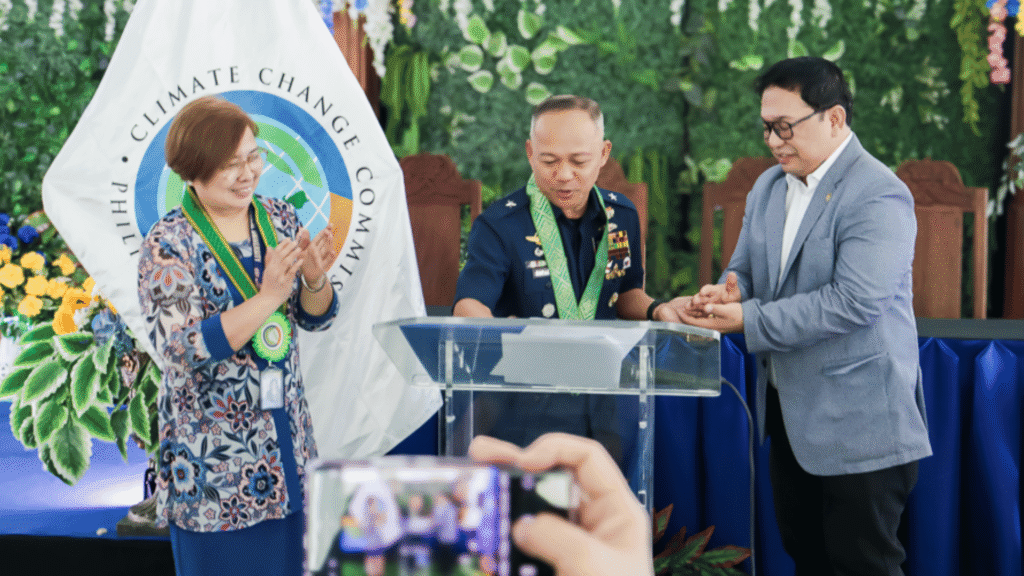Rizal Technological University (RTU) took center stage in advancing the nation’s climate and sustainability agenda by hosting the “Cities in Transition: Stakeholder Convergence for Renewable Energy and Climate Commitments” on October 24, 2025, at the RTU Mandaluyong Campus, in partnership with the Climate Change Commission (CCC).
The event brought together representatives from national government agencies, local government units, academic institutions, civil society organizations, and private sector partners to strengthen multi-sectoral collaboration in support of the country’s climate resilience and low-carbon transition goals.
RTU President Dr. Ma. Eugenia M. Yangco welcomed the distinguished guests and participants, underscoring the university’s firm commitment to advancing sustainability and transforming its campus into a model for renewable energy and climate action. She emphasized that universities play a crucial role in linking research, policy, and community action. “We at RTU believe that sustainability begins within the campus and radiates outward to the communities we serve,” said Dr. Yangco. “This convergence reaffirms our collective mission to act now for a more resilient and livable future,” she added.
A significant highlight of the event was the signing of multilateral agreements among partner institutions and organizations to implement the Climate Action and Food Security Program, which establishes collaborative frameworks for bamboo-based urban greening, renewable energy deployment, and carbon market development. Signatories included the 5th Infantry Division of the Philippine Army, Bureau of Corrections, Bauertek Farmaceutical Corporation, Ecosaver Mutual Fund, Alcom Carbon Markets Philippines, and academic partners, such as Isabela State University (ISU) and Nueva Ecija University of Science and Technology (NEUST). These collaborations aim to integrate nature-based solutions, technological innovation, and post-processing research to scale up sustainable climate initiatives across urban and reservation areas.
The first half of the event featured keynote discussions from national agencies and climate experts, including Commissioner Albert P. Dela Cruz of the Climate Change Commission, who presented the program rationale and emphasized the country’s national commitments to climate action: Dr. Shirley Agrupis, Chairperson of the Commission on Higher Education (CHED), and Asec. Francisco R. Cruz, from the Department of Interior and Local Governance (DILG), delivered special messages encouraging stronger inter-agency cooperation. Atty. Richard Bihasa, Executive Assistant to the Commissioner of CCC, outlined the Commission’s mandate in driving policy and coordination efforts.
Sectoral presentations followed, tackling urban housing adaptation, climate-resilient road networks, and green city design, led by experts from the Department of Human Settlements and Urban Development (DHSUD), Metro Manila Development Authority (MMDA), and the Philippine Institute of Environmental Planners (PIEP).
A dynamic panel discussion on nature-based solutions and cooperation for climate action featured representatives from the Philippine Bamboo Industry Development Council (PBIDC), Cooperative Development Authority (CDA), and Saakuru Labs, highlighting both local and technological approaches to sustainability.
In the afternoon half of the conference, discussions shifted to renewable energy pathways and digital innovation. Hershey T. Dela Cruz from the Department of Energy and Jerome Ilagan from the CCC explored the operationalization of the National Adaptation Plan (NAP) and integration of renewable energy in national emissions reduction efforts.
Ecosaver presented its Carbon Footprint Calculator, a gamified platform that promotes individual participation in achieving carbon neutrality. This innovation reflects how digital solutions can empower citizens to measure and reduce their environmental impact.
The convergence culminated in a Pledge of Commitment by participating organizations, reaffirming a shared vision of achieving Net Zero emissions by 2050 through a whole-of-community approach. Comm. Albert Dela Cruz Sr. of the CCC led the ceremonial pledge, followed by the awarding of certificates and recognition tokens to partners who demonstrated outstanding dedication to climate and sustainability initiatives.
In the event’s closing, Comm. Dela Cruz commended RTU for its leadership in uniting diverse stakeholders toward a sustainable future, remarking that “climate action is not the work of one agency, but of one nation working together.”
The event marks a landmark in RTU’s sustainability journey, reflecting its proactive efforts to integrate renewable energy, carbon market education, and urban greening into its academic and community programs.
As to Instr. Donato Z. Estocada, Director of the International Affairs and Linkages Office and Chair of RTU’s Campus Sustainability Committee, “RTU is proud to be part of this national movement. Together with our partners, we will continue to transform our campus and communities into beacons of sustainability, resilience, and hope.”
Through initiatives like this, Pandayang Rizalia continues to lead the charge in climate education and action, proving that academic institutions can be powerful catalysts for the country’s transition toward a greener, carbon-neutral future.








